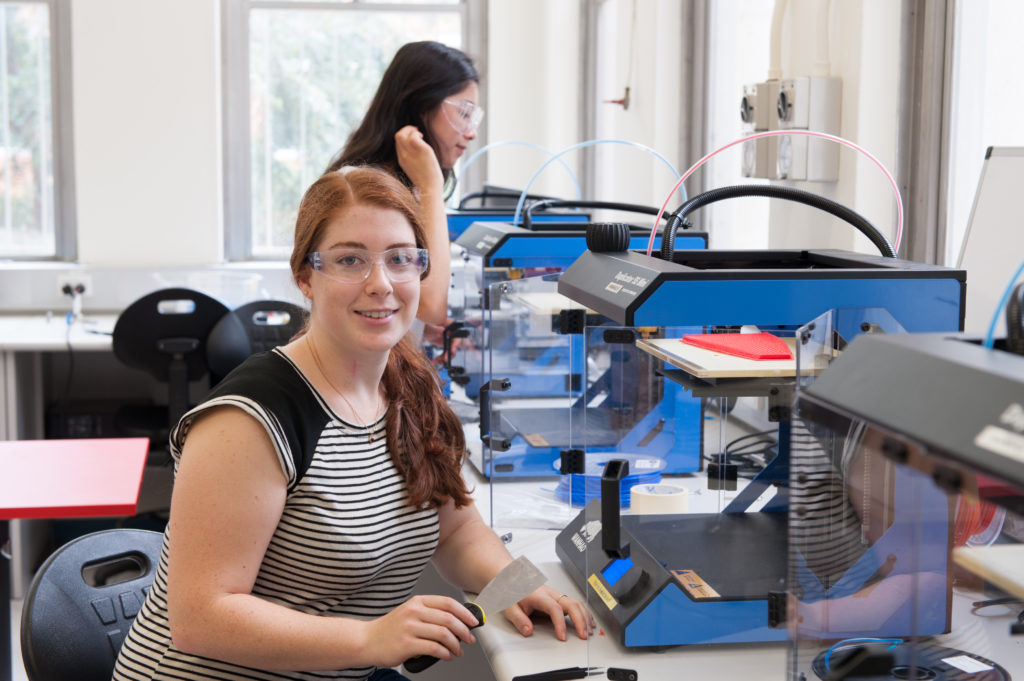Globalisation, automation and rapidly changing needs mean the future of employment will probably look very different to now. In fact, many current careers won’t exist in the next 10 to 20 years. So, it’s critical that students ask the important question: ‘Will my chosen study path lead to strong job opportunities after graduation and beyond?’
In this series, we’re exploring a range of occupations forecast to have strong employment prospects in the future. Some careers in the tech industry are quickly emerging. Plus, there are other existing careers that will also have an important place in the employment opportunities of tomorrow.
Engineers are building our future. An incredibly versatile and diverse career pathway, engineering is essential for societal, environmental and economic development worldwide. Plus, experienced engineers are in global demand, with the industry expected to grow significantly in the future. Are you creatively minded with a flair for science and maths? Do you want to use your skills to address real-world problems? If your answer is ‘yes’, an engineering career might be for you.
Why Engineering?
Engineering gives you the opportunity to use practical models grounded in science and mathematics, and combine them with creative, innovative thinking. You’ll be solving problems, producing new technologies, and developing and improving existing ones to benefit communities worldwide. From making solar energy more efficient or developing materials to support the growth of human cells to creating smaller and more accessible smartphones or designing supercars, engineering encompasses all of this. As Albert Einstein once said, “Scientists investigate that which already is. Engineers create that which has never been.”
There’s a major to suit nearly anyone
Engineering degrees are often paired with a range of majors or specialisations, meaning there’s usually a course to suit your interests. For example, at the Australian National University (ANU) in Canberra, engineering students can specialise in biomedical systems, electronic and communication systems, mechanical and material systems, mechatronic systems, photonic systems, renewable energy systems, and sustainable systems. Phew!
Engineers are in demand all over the world
Engineers are in high demand worldwide; every country around the world needs engineers to help improve the way we live.
Accredited engineering courses make it easy for graduates to access employment opportunities. In Australia, Engineers Australia accredits certain programs at institutions across the country. These courses are recognised nationally and internationally, making them perfect for international students. By completing one of these accredited courses, graduates can become members of Engineers Australia and are given the opportunity to take their skills overseas.
Graduates are multi-skilled
Engineers don’t just study science and maths. A successful engineering qualification will provide graduates with plenty of transferrable skills, including knowledge of economics, ethics, business and communication, incredible attention to detail, and the ability to work well with other people.
Engineers make a difference
Whether they’re developing sustainable energy systems, broadening medical horizons, building new structures, or tackling the issue of pollution, engineers help the world by addressing problems here and now. Engineers need to be able to design, analyse and manage the complex systems of the future so that they’re able to continue to adapt and improve this developing world.
Education Options
To specialise in engineering, you will need to complete a qualification that is designed with industry to ensure you develop the skills and expertise in response to global demand. Relevant options include:
- Bachelor of Engineering (with a diverse range of specialisations/majors)
- Master of Engineering
- PhD in Engineering with specialisation
Meet Bachelor of Engineering (Honours) students at the Australian National University
Samuel Palmer made the move to Canberra to study at ANU. He was seeking a flexible degree with great employment outcomes for graduates.
“When I started at ANU, I wasn’t really sure where my degree could take me,” he says. “I still have two years to go and now I’m spoilt for choice! I’ll be able to pursue a career in technical engineering, consultancy, or even development.”
International student Andrea Bedón Pineda has taken up a range of extracurricular activities on top of her engineering degree. These have helped her gain skills in public speaking and leadership. She hopes to take these transferrable skills and her education in engineering to set up a social enterprise in her home of Ecuador.
“I have gained knowledge and experience in and out of class to ensure I understand how to work on negotiations, team working, and leadership,” she says. “I’m equipped with hard and soft skills to pursue a successful professional journey.”
For student Matilda Dowse, a Bachelor of Engineering will help her fulfil her dream of leading social change.
“A systems engineering degree will help me to greater understand the ways in which all the different aspects of any engineering project connect, interact, and how to organise them for the best result,” she says.
Matilda also encourages women to apply for the degree: “For the many goal-oriented young women with a strength in leadership and passion for applying science, I couldn’t recommend the degree more.”





